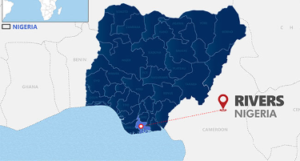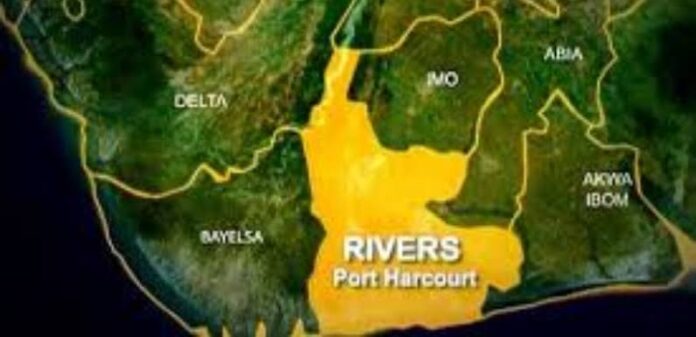In a remarkable development, ten maritime travellers who were abducted along the notorious Bonny – Port Harcourt waterway earlier this week have been rescued and are now safe. The travellers were taken captive on Monday, September 2, in an incident that left many in the region anxious about the growing threat of piracy and kidnapping along the water routes. However, thanks to the diligent efforts of the Nigerian Navy’s Forward Operations Base (FOB) in Bonny, the victims regained their freedom after an intense search operation.
According to sources close to the rescue operation, the kidnappers abandoned their captives when they realized that naval operatives were hot on their trail. The source, who chose to remain anonymous due to the sensitive nature of the operation, shared that the Navy had been tracking the kidnappers’ movements since the incident was reported. The quick response by the Nigerian Navy, especially the operatives stationed at FOB Bonny, played a critical role in pressuring the kidnappers to flee. The captors, sensing that their capture was imminent, decided to abandon their victims along the Onne channel, allowing the travellers to escape unharmed.
Upon their release, the victims were immediately transported to the base for a thorough medical evaluation. Naval personnel ensured that the travellers were in good health before reuniting them with their families. The medical checkups provided much-needed relief to the victims, who had endured a harrowing ordeal at the hands of their abductors.
 Though neither the Nigerian Navy nor the police have officially released a statement regarding the rescue, it is clear that the joint efforts of the security agencies are yielding positive results in the fight against piracy and maritime kidnapping. The absence of an official statement has not diminished the significance of the rescue, as it underscores the growing competence and determination of Nigerian security forces in combating such threats. While the authorities are yet to disclose the full details of the operation, sources confirm that the agencies involved are doubling down on their efforts to eradicate criminal activities along the nation’s waterways.
Though neither the Nigerian Navy nor the police have officially released a statement regarding the rescue, it is clear that the joint efforts of the security agencies are yielding positive results in the fight against piracy and maritime kidnapping. The absence of an official statement has not diminished the significance of the rescue, as it underscores the growing competence and determination of Nigerian security forces in combating such threats. While the authorities are yet to disclose the full details of the operation, sources confirm that the agencies involved are doubling down on their efforts to eradicate criminal activities along the nation’s waterways.
The Bonny – Port Harcourt waterway has long been a critical route for both commercial and private maritime traffic, but it has also been plagued by frequent incidents of piracy, kidnappings, and other criminal activities. The route is particularly vulnerable due to its strategic importance, serving as a key channel for oil transport and trade. In recent years, sea pirates and criminal gangs have exploited this, targeting vessels, boats, and travellers in the region. The Nigerian Navy, alongside other security agencies, has been battling to restore safety and security in the area, often facing considerable challenges in navigating the difficult terrain and combating well-armed pirate groups.
The successful rescue of these ten travellers is a significant victory in the broader campaign against sea piracy in Nigeria’s coastal waters. Over the years, maritime crime has posed a serious threat to the country’s economic activities, particularly in oil-producing regions like the Niger Delta, where the Bonny – Port Harcourt waterway is located. The Nigerian government, in collaboration with international partners, has launched several initiatives to curb the activities of pirates and kidnappers in the Gulf of Guinea. However, despite these efforts, incidents of abduction along the waterways have continued to occur, making the rescue of these ten victims a notable achievement.
It is believed that the swift action taken by the Nigerian Navy’s FOB Bonny was informed by strong intelligence gathering, which allowed them to track the kidnappers’ movements from the moment the incident was reported. The Navy’s focus on intelligence-led operations has been a key factor in its recent successes in maritime security. By utilizing local intelligence and surveillance, the operatives were able to anticipate the kidnappers’ actions and mount a coordinated response that ultimately forced the criminals to abandon their captives.
Security experts have long advocated for a stronger focus on intelligence in dealing with maritime crimes. This incident underscores the importance of having security operatives with a deep understanding of the local terrain and the criminal networks that operate within it. The presence of the Forward Operations Base in Bonny has proven invaluable in this regard, providing a forward operating location from which the Navy can launch swift and effective interventions when incidents like these occur.
While the successful rescue of the abducted travellers is a cause for celebration, both the Navy and police have indicated that they will not rest on their laurels. According to sources within the security apparatus, efforts are being intensified to track down the kidnappers who fled the scene. The goal is not just to rescue victims but to dismantle the criminal networks responsible for these heinous acts. With maritime crime continuing to be a significant issue in the region, security forces remain committed to maintaining pressure on these groups and preventing future incidents.
For the families of the rescued travellers, the news of their release has brought immense relief. The trauma of having a loved one abducted is a heavy burden, and the timely intervention of the Nigerian Navy has prevented what could have been a far more tragic outcome. The victims, now safely back with their families, are expected to undergo further debriefing by security officials to help provide any additional information that may assist in the ongoing investigation.
As the nation continues to grapple with the issue of insecurity, especially in its maritime regions, the successful operation by the Nigerian Navy stands as a testament to the progress being made. Though challenges remain, the rescue of these ten travellers offers hope that with continued vigilance and cooperation between security agencies and local communities, Nigeria can turn the tide against maritime crime and restore peace to its waterways.




